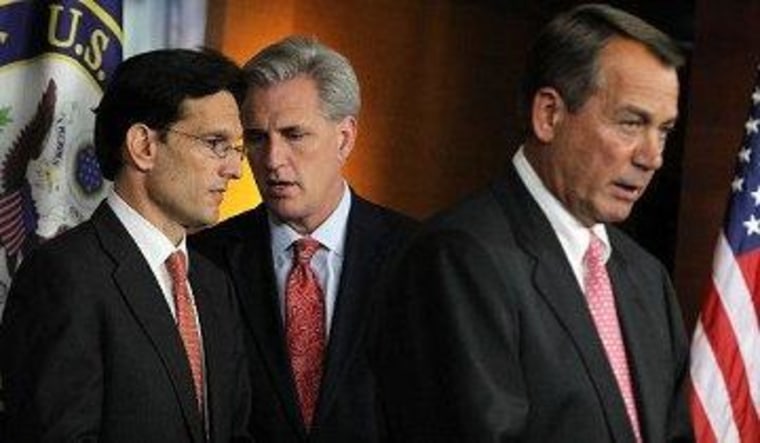For all the scuttlebutt about a Senate agreement this afternoon, negotiators had not -- and have not -- resolved major issues such as the automatic spending cuts in sequestration, suggesting much of the relief was wildly premature. There's still a very real chance the ongoing negotiations will simply fail.
But there was another lingering question for which there was no answer: even if the Senate crafted a deal, could it pass the House? It appears we won't find out until after the clock runs out.
Awaiting action by the Senate, the leaders of the House of Representatives have announced they will stage no votes this evening, ensuring the nation will go over the fiscal cliff for at least a day."We don't have anything to vote on before midnight," tweeted Brendan Buck, a spokesman for House Speaker John Boehner (R-Ohio). "The House will take action after the Senate passes something."
This seems to have caused quite a stir for many in the media, but I'd caution against a freak-out. Indeed, this isn't even that big a surprise -- the Washington Post reported 12 hours ago that the House members "may push to delay a vote until Tuesday," and with "U.S. financial markets closed for the New Year's holiday," it's likely the effects would be quite limited.
Besides, while I'm generally not in the habit of defending the Boehner-led House, I'd also point out that the lower chamber has nothing to vote on. We're about seven hours from midnight, and there is no Senate agreement, no sense of when there might be an agreement, no sense of when the Senate might vote on a possible agreement, and no certainty that the still-incomplete agreement would earn the Senate's approval anyway. It's tough to blame House leaders for failing to schedule a vote on a bill that, at this point, doesn't exist.
And then there's that other factor: as of 12:01 a.m., the House gets to work with a new baseline -- and you'd be surprised how much that's likely to matter to House Republicans.
You'll recall that House Speaker John Boehner's "Plan B" failed because GOP lawmakers perceived it as voting for a tax increase. Yes, it froze lower rates on income up to $1 million, but because it allowed higher rates to kick in on income above $1 million, Republicans interpreted it as a de facto vote for higher taxes, which they perceive as wholly unacceptable under any circumstances.
Tomorrow, the rules of the game change. It may seem like semantics, but after midnight, the rates go up automatically. Given this, if the Senate approves a package that applies lower rates to income up to $450,000 and higher rates on all income above $450,000, that vote is qualitatively different tomorrow than today -- before midnight, it's a vote to allow rates to go up on the very wealthy; after midnight, the rates for the wealthy would literally stay the same because they will have already gone up.
Republicans could vote, or at least consider voting, for a Senate package without anyone suggesting they voted for higher taxes. The Senate package, at least in its current, incomplete form, would be solely a tax break on income up to $450,000 -- while maintaining a new status quo on rates applying to all additional income.
Would these nuances really matter than much to House Republicans? You bet they would.
